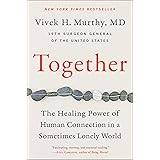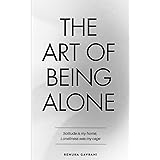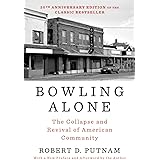
Download the free Kindle app and start reading Kindle books instantly on your smartphone, tablet, or computer - no Kindle device required.
Read instantly on your browser with Kindle for Web.
Using your mobile phone camera - scan the code below and download the Kindle app.

OK
 Audible sample Sample
Audible sample Sample 


Loneliness: Human Nature and the Need for Social Connection Audio CD – Unabridged, August 19, 2008
- LanguageEnglish
- PublisherTantor Audio
- Publication dateAugust 19, 2008
- Dimensions6.4 x 1.1 x 5.3 inches
- ISBN-101400108128
- ISBN-13978-1400108121
Books with Buzz
Discover the latest buzz-worthy books, from mysteries and romance to humor and nonfiction. Explore more
Similar items that may ship from close to you
Editorial Reviews
Review
Product details
- Publisher : Tantor Audio; Unabridged CD edition (August 19, 2008)
- Language : English
- ISBN-10 : 1400108128
- ISBN-13 : 978-1400108121
- Item Weight : 8.8 ounces
- Dimensions : 6.4 x 1.1 x 5.3 inches
- Customer Reviews:
About the author

John Cacioppo is the Tiffany and Margaret Blake Distinguished Service Professor of Psychology, Director of the Center for Cognitive and Social Neuroscience, and Past-Director of the Arete Initiative of the Office of the Vice President for Research and National Laboratories at The University of Chicago. He is a pioneer in the field of social neuroscience and an expert in social isolation, emotional contagion, and social behavior. Dr. Cacioppo completed his PhD at Ohio State University and served on the faculty at the University of Notre Dame (1977-1979), University of Iowa (1979-1989), Ohio State University (1989-1999), and University of Chicago (1999-present). He also served as the Bijzonder Hoogleraar Sociale Neurowetenschappen (External Professor Chair in Social Neurosciences) Free University Amsterdam (2003-2007), and a Guest Professor at State Key Laboratory of Cognitive Neuroscience and Learning, Beijing Normal University (2008-2010). He is a Past-President of the Association for Psychological Science (2007-2008), the Society for Psychophysiological Research (1992-1993), the Society for Consumer Psychology (1989-1990), the Society of Personality and Social Psychology (1995), and he is currently the Chair-Elect of the Psychology Section of the American Association for the Advancement of Science. He is a recipient of the National Academy of Sciences Troland Research Award (1989), the Society for Psychophysiological Research Distinguished Scientific Award for an Early Career Contribution (1981) and their Award for Distinguished Scientific Contributions to Psychophysiology (2000), the Society for Personality and Social Psychology Donald Campbell Award for Distinguished Scientific Contributions (2000), the American Psychosomatic Society Patricia R. Barchas Award (2004), the Psi Chi Distinguished Member Award (2006), the American Psychological Association Distinguished Scientific Contribution Award (2002), an honorary doctorate from Bard College (2004), the Society for Personality and Social Psychology Theoretical Innovation Prize (2008), the Society of Personality and Social Psychology Award in Service to the Discipline (2008), and the American Psychological Association’s Presidential Citation (2008). He has also served on various boards including the Department of HHS National Advisory Council on Aging; the External Advisory Committee of the Beckman Institute for Advanced Science and Technology at the University of Illinois; and the National Research Council Board on Behavioral, Cognitive and Sensory Sciences (2010-present); and he Chairs the International Advisory Board of the Cluster of Excellence at Freie Universität Berlin (2008-present). He has published more than 400 papers and 17 books, is listed among “ISI Highly Cited Researchers” in Psychiatry/Psychology (since 2003), and is a Fellow of the American Association for the Advancement of Science (1990), Society of Experimental Psychologists, Association for Psychological Science (1989), American Psychological Association (1984), International Organization of Psychophysiology (1987), Society for Personality and Social Psychology (1984), Society of Behavioral Medicine (1998), Academy of Behavioral Medicine (1986), and American Academy of Arts and Sciences (2003).
Customer reviews
Customer Reviews, including Product Star Ratings help customers to learn more about the product and decide whether it is the right product for them.
To calculate the overall star rating and percentage breakdown by star, we don’t use a simple average. Instead, our system considers things like how recent a review is and if the reviewer bought the item on Amazon. It also analyzed reviews to verify trustworthiness.
Learn more how customers reviews work on AmazonReviews with images
-
Top reviews
Top reviews from the United States
There was a problem filtering reviews right now. Please try again later.
He adds: "Given the statistical impact of loneliness, if its effects were caused by an impurityin our air or water, perhaps now there would be congressional hearings on how to reduce it. Perhaps we can hope for a similar awakening to the idea, grounded in rigorous science, that restorning bonds among people can be cost-effective and practical point of leverage for solving some of our most pressing social problems, not the least of which is the looming crisis in health care and eldercare."
Dr. Cacioppo points out the need for a place for people to gather and demonstrates how places of faith worship have fulfilled that need in the past. "The type of Christianity tht went on to become the primary structural element of the Western world focused on a simple message of self-esteem - "The kingdom of God is within you" -- combined with communal meals and even communal living. Its streamlined theology set aside the complex cleansing rituals of Judaism, and it presented evil less in mystical terms and more as a question of the behavior of one person toward another. The church that survived and prospered extended the basic ethics of the Hebrew tradition -- already a strong source of social support -- explicitly into the individual's inner life, creating a prohibitions against mere thoughts that were harmful to social connections: anger, hatred, misdirected lust. It dispensed with the temple in Jerusalem as the center of religious life, but maintained rituals to sanctify the basic elements of ordinary human existence: reproduction (marriage), birth (baptism), illness (anointment), and death (last rites). By way of these ceremonies it provided guidelines for social connection throughout the life cycle, making this universal church a practical social convention; It offered self-worth, it buried the dead, and it provided for the poor. Like Judaism, Islam, Confucianism and Buddhism, Christianity regulated all social transactions with the community, ranging from relationships within marriage and the family to standards for conducting business and dealing with neighbors."
Social connections are life saving connections. When we gather with our family, friends and neighbors, we produce the "happiness hormone" Oxcytocin. When we are isolated, when we move far away from family, when we begin to age and lose the close contact with our children our friends, when we stop going to church because the beliefs we once held are no longer relevant to us, is when we begin our own decline. We need other people in our lives. It's as important to have people who care about us and who we care about as it is to have the very oxygen we breath in the air.
I am a technology buff. I love my Apple devices. However, after reading Loneliness, I have awakened my appreciation of and my awareness for the need to put those amazing devices in their separate compartments in my life. If we do not break the hold technology has on the majority of people today, we will suffer the coming consequences of being Avatar's instead of human beings.
I love and appreciate Dr. Cacioppo's work on loneliness. It's a topic all too often not only disregarded in todays fast paced society but an aspect of life that has faded into the background of the screens of our devices. We no longer sit on a porch on a warm summer evening sharing a cool drink or a beer with a couple of neighbors while the children play around us. We are all too busy checking our devices, making comments on Facebook, or playing video games. As Dr. Caccioppo points out people need real people in front of them - talking, laughing, sharing, learning from each other. We need to see their faces, feel their emotions, read their body language and feel their touch. Emoticon's are a very poor attempt to replace actual living human beings in our lives.
Apparently, I'm not the only person who's having this problem. Loneliness: Human Nature and the Need for Social Connection by University of Chicago professor John T. Cacioppo and former Harvard University Press science editor William Patrick use examples of everyday people and their struggles with loneliness. Along with scientific studies, historical anecdotes and a smattering of humor, the authors paint a fully-rounded picture of the mental, emotional, physical and societal issues caused by social isolation.
This isn't the first mainstream book to examine the current dwindling of conventional social outlets in the U.S. Bowling Alone: The Collapse and Revival of American Community by Robert Putnam, addressed the lack of social connection in America. While Putnam's book looked at the sociological ramifications of Americans not bonding in social groups (like bowling leagues), Cacioppo's book looks at the personal problems caused by nonexistent (or superficial) social interaction. Loneliness can cause physical pain as well as emotional pain, and some it may cause life-threatening problems like heart disease in extreme cases.
The need to relate to others is intrinsic to humans, it's in our genes, Cacioppo writes, peppering the book with examples from sundry characters throughout history. He writes about the only surviving member of an African tribe sent to America to perform in a World's Fair. Shortly thereafter, his tribe back home were killed. Now left alone in the world, he was unable to adjust to a new life in the Christian world. Another story relates the tale of a seemingly affable man who had ulterior motives for that friendliness. The psychological ramifications of childhood trauma, past bad relationships and other emotional disasters eek their way into us so that even as adults, some people have difficulty connecting with others. The stories interwoven in this book illustrate that in real life terms the reader can understand.
For a self-help tips, people struggling with loneliness should check the step-by-step guide in Chapter 13, Getting It Right. It lists a number of ways to work on alleviating loneliness. It's not about segueing from nights watching TV by yourself to being the life of the party; it's about meaningful social connections. As Loneliness: Human Nature and the Need for Social Connection stresses, it's about the quality of relationships, not the quantity.
Top reviews from other countries
Pratico, spiega ogni passaggio molto bene, ha una scienza dietro e ti fa capire quanto le persone sono importanti. Ha cambiato dei miei comportamenti!













